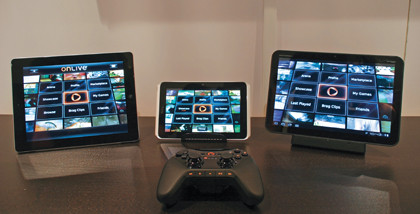OnLive vs Gaikai: cloud gaming explored
Gaikai and OnLive could mean big things for the PC gamer
Sign up for breaking news, reviews, opinion, top tech deals, and more.
You are now subscribed
Your newsletter sign-up was successful
More fibre needed

But that's the nature of the beast: ever-changing. When we first got our hands on the two services, the games we played suffered noticeable input lag and looked like YouTube videos. Currently the visual fidelity issues remain to an extent, but the input lag seems to have been minimised lately.
As our dear old Blighty's data pipeline gets a bit more 21st century and fibre optic broadband becomes the household standard, we just might see a cloud gaming experience that's imperceptible from a locally run game in the coming years. And that would be a scary development for hardware manufacturers.
Andrew Ditchburn, Gigabyte's mainboard product manager, doesn't seem all that spooked though: "Cloud gaming could be the beginning of something big in the console market, but personally I don't think it will every truly become mainstream in the PC market. Consoles cannot be easily upgraded and [creating] storage space for games, music and movies is always a problem - in the PC market upgrades are not really an issue."
PC gamers will still demand performance gear, Ditchburn maintains: "Personally we don't see the need to adapt. PC gamers are normally very demanding on the requirements of their systems, and upgrading provides an opportunity to gain an advantage over their competition. Also PC enthusiasts tend to take pride in the quality of their PC and hardware installed."
This calm and even encouraging anticipation of cloud gaming's advent is shared by John Inwood, MSI's UK marketing manager. "It is yet to be seen if [cloud gaming] is a phase or something which will become mainstream, however it is clear that there are a number advantages to gaming in the cloud which could see it establish itself for some time to come… however, the gaming experience on the cloud is still a long way from that of gaming on a dedicated PC. It's not likely that we'll see any trends forming in favour of lower spec PCs as a result. If anything, this may have more of a significant effect on the console market - the experience consoles offer is a lot more comparable [than the PC] to that of cloud gaming."
Cloud gaming means business, and in business there are winners and losers. Component manufacturers insist they won't be losers, but messrs Ditchburn and Inwood both agree who will be - the console market.
Console killer?

A recent quarterly report posted by Microsoft's entertainment and devices division (comprising all things Xbox) revealed that the division accounts for just 10 per cent of Microsoft's overall revenue, and generates just 2 per cent profit on that revenue. Those figures cover Xbox 360's Kinect-related resurgence, too.
Sign up for breaking news, reviews, opinion, top tech deals, and more.
Sony, whose PlayStation Move motion controllers didn't quite steal the market share from Microsoft and Nintendo is hardly enjoying a golden age either. Both giants have suffered at the idle thumbs of casual gamers, losing market share to iOS apps and social networking site games, such as FarmVille.
Current generation consoles are being left behind, and that trend hasn't been missed by some of the industry. Blitz Games' CEO Philip Oliver expects games to be distributed primarily in digital form in the near future: "If you were designing a machine right now, why would you want physical media? It would be crazy."
THQ's Brian Farell went one further at the first cloud gaming conference in San Diego this September, boldly predicting that the next wave of consoles will move to the cloud entirely.
From a publisher's perspective, it's exciting: "no physical goods cost for game makers, no inventory, no markdowns, and all the money spent by the consumer would go to the developer or publisher". You only have to look at OnLive's Game System, a micro-console and controller, to get an insight into their commercial aspirations - it's going after console and casual gamers.
PC Gaming Alliance President Matt Ployhar contemplates the impact of cloud gaming: "By and large I believe that streaming works in favour of the PC. Consoles can also benefit, however due to their proprietary nature, I believe they're somewhat less compelling.
"Would you rather choose to ship your game for 500 to 600 million households worldwide? Or better yet… integrate PC functionality into every TV and hit close to a billion households? Or would you rather target the individual active users on an Xbox 360, PS3, or Wii which are, on their best days at best one tenth of the active install base of PC users; or one twentieth of TV households?"
The widespread adoption of motion controllers is testament to the current generation of consoles' ability to adapt to rapidly changing user demands. With competitors now jumping on the motion control bandwagon, it's clear that Sony, Microsoft and Nintendo will need to reinvent themselves again to compete with cloud gaming services - and by all accounts, it'll be a tough battle.
The next step for services such as OnLive is to get developers to optimise their games for the cloud. It's something CEO Steve Perlman is keen to see in the near future, and may well result in a smoother, better quality experience for the gamer. But how receptive are developers to this notion?
Cloud friendly

Kieran Brigden, the Studio Communications Manager at Creative Assembly, provides some insight on his very PC-focussed studio's viewpoint: "It's hard to be sure what the technical issues would be, but lag is clearly a big one and would probably require very careful design to hide it or mitigate the impact … With games like the Total War series, another issue would be what level of graphics to provide.
"We design TW games to last for many years, so they scale extremely well. The player can 'turn up' the graphics all the way from a cheap netbook to well beyond what current top-end hardware can cope with. What would the cloud be able to cope with? Would it be able to deliver graphics that no home PC is capable of? Is the same true of AI?"
Distribution and developer-publisher relationships are another area for consideration: "There are always going to be many routes to market for a game, even within a single distribution platform. The infrastructure required to make the most of a developer's [product] will still be substantial, and it's publishers that provide that. Large developers could opt to carry that overhead, but in doing so they will become publishers. Nothing has changed in that respect."
Despite his obvious excitement for the possibilities cloud gaming provides, when asked if developers want their games to be played over the cloud rather than locally, Kieran is succinct: 'Not yet…' What does it all mean for the PC, then?
Hardware manufacturers are unlikely to go bust at the expense of cloud gaming. PC traditionalists will always want to own and play their content locally, enthusiasts will gladly pay £500 for a graphics card and twitch gamers will always look to gain a technological advantage over the competition.
Every breed of gamer enjoys a demo though, and thanks to Gaikai it's likely to be easier to try before you buy. Power to the consumer! It's still up to the publishers and Gaikai themselves whether games actually appear prior to release dates, of course.
OnLive looks likely to be massive for the casual gamer, console gamer and tablet user, but it could indirectly benefit our platform hugely. If the PC enthusiast dares to dream, the increased revenue for PC titles could change what publishers see as commercially viable in a game, and give us weird and wonderful new projects.
Piracy's unlikely to go away entirely, but the availability of demos and the headaches involved with remotely run content might at least curb it. Then we might be able to kiss goodbye to today's horrible DRM. Our PC renaissance might be just around the corner.

Ad creative by day, wandering mystic of 90s gaming folklore by moonlight, freelance contributor Phil started writing about games during the late Byzantine Empire era. Since then he’s picked up bylines for The Guardian, Rolling Stone, IGN, USA Today, Eurogamer, PC Gamer, VG247, Edge, Gazetta Dello Sport, Computerbild, Rock Paper Shotgun, Official PlayStation Magazine, Official Xbox Magaine, CVG, Games Master, TrustedReviews, Green Man Gaming, and a few others but he doesn’t want to bore you with too many. Won a GMA once.